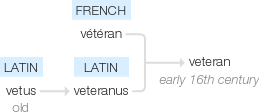Veteran
early 16th century: from French vétéran or Latin veteranus, from vetus ‘old’.
wiktionary
Borrowed from Middle French vétéran, from Latin veterānus.
etymonline
veteran (n.)
c. 1500, "old experienced soldier," from French vétéran, from Latin veteranus "old, aged, that has been long in use," especially of soldiers; as a plural noun, "old soldiers," from vetus (genitive veteris) "old, aged, advanced in years; of a former time," as a plural noun, vetores, "men of old, forefathers," from PIE *wet-es-, from root *wet- (2) "year" (source also of Sanskrit vatsa- "year," Greek etos "year," Hittite witish "year," Old Church Slavonic vetuchu "old," Old Lithuanian vetušas "old, aged;" and compare wether). Latin vetus also is the ultimate source of Italian vecchio, French vieux, Spanish viejo. General sense of "one who has seen long service in any office or position" is attested from 1590s. The adjective first recorded 1610s.
